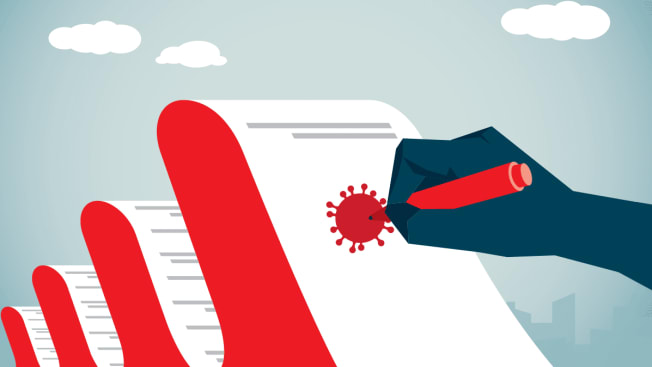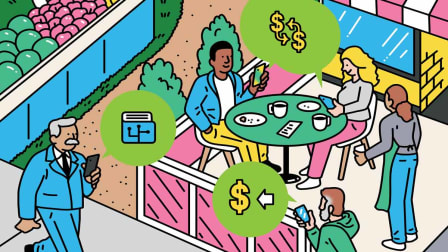If You're Asked to Sign a COVID-19 Waiver, Use This Road Map to Help With Your Decision
Waivers are becoming more commonplace as businesses reopen

Even as coronavirus cases climb across the nation, many businesses are trying to reopen, and some are doing so with a new twist—asking customers to sign documents waiving their right to sue in the event that they contract COVID-19 on the premises.
At the same time, some companies are asking employees to sign COVID-19 waivers, hoping to limit their liability if workers catch the virus at work.
Should you sign such a waiver? Can your employer force you to sign one in order to return to work? And what rights are you giving up if you do?
We put those questions to a range of legal experts to create the following guidelines and recommendations.
First, a few important preliminary points.
One: The legal and safety implications of COVID-19 waivers are somewhat distinct for these two groups—consumers and workers—and should be given separate consideration, as they are below.
Consumer Waivers
If you’ve ever bought a lift ticket at a downhill ski mountain or taken your kids to a water park, you know that being asked to sign a liability waiver is not new. By signing, you generally acknowledge that the activity you’re about to participate in or the service you’re about to accept involves a degree of risk—and agree not to sue the business if you’re injured even if the business is at fault.
What’s new in the COVID-19 era is that customers are being asked to sign such waivers by many businesses and institutions not previously thought to pose even modest danger, including hair salons, co-working spaces, schools, daycare centers, and restaurants. And some venues that might have asked you to sign a liability waiver in the past, such as health clubs, are now requiring members to sign new COVID-19-specific waivers.
Some advice:
• Think (at least) twice before signing. That’s a central message of the legal experts we consulted, who expressed varying levels of caution about signing COVID-19 waivers but were unanimous in saying no consumer should sign one without thorough consideration.
Why? Because “your default should be not giving up your rights,” says Julia Duncan of the American Association of Justice, a nonprofit organization of lawyers who represent consumers injured or harmed by corporate misconduct. At the very least, she says, be aware of what you’re signing away and weigh that against the benefit you’d be getting in exchange. “Ask yourself, ‘Do I really need to do this thing?’”
That’s also a good question to ask because the answer could affect the legal power of the waiver. Courts are more likely to find a waiver to be unenforceable if it involves an “essential” business, such as a grocery store or pharmacy, Marc Lamber, a personal injury lawyer, wrote in a recent Law360 article, because “walking away might be less of an option with such businesses.”
Other experts make a more pragmatic case for caution, counseling that you pause before signing and consider questions of health and safety. “The focus shouldn’t be on whether you sign or not but on whether the business is being careful,” says Florencia Marotta-Wurgler, a professor at NYU School of Law in New York City.
If, for example, you look around and see that workers and customers are not routinely maintaining social distance or wearing masks, or that the operation has not taken steps to establish COVID-19 protocols—such as limiting the number of customers inside, installing Plexiglas shields, and posting visible social distancing reminders—be especially wary of signing a waiver, Marotta-Wurgler says, and consider leaving altogether.
Elizabeth Tippett, a law professor at the University of Oregon who wrote a recent article about COVID-19 waivers, suggests that the waiver document itself can help you decide whether the business is doing what it can to protect customers from the virus. “Your legal risks and your health risks are intertwined,” she says.
What should you look for? Tippett says it’s a good sign if, in addition to asking customers to relinquish their right to sue, the waiver describes precautions the business is taking or otherwise acknowledges that the business shares responsibility for the safety of its customers. Another encouraging factor: If the waiver makes customers commit to taking their own precautions, such as wearing masks on the premises and staying home if they feel ill or feverish.
If, on the other hand, the waiver language does little more than shift all risk and responsibility to the customer, “that might be a sign that they aren’t taking their responsibility seriously,” Tippett says.
• Understand what a waiver can (and can’t) do. Several legal experts put the most emphasis on safety considerations—rather than legal ones—because they believe that consumer COVID-19 waivers have limited practical significance.
Here’s why: If a business has taken reasonable steps to lower the risk of COVID-19 transmission, says Myriam Gilles, a law professor at New York City’s Benjamin N. Cardozo School of Law, a COVID-19 liability lawsuit against it would be almost impossible to prove and win, given the many potential ways one could contract the virus. “I don’t see how anyone with COVID could prove they caught it in a particular place,” she says. “No lawyer that I know would take that case.”
On the other hand, she says, if the business is clearly disregarding basic, reasonable precautions, it could indicate that it’s being, in the language of the law, “grossly negligent” or “reckless.” In that case a waiver probably won’t protect it from a liability suit anyway. And evidence of the recklessness might go a substantial distance toward proving “causation” to a judge or jury.
If that’s the case, why are businesses nevertheless asking customers to sign COVID-19 waivers? Mostly to protect themselves from frivolous lawsuits, says Bettina Strauss, a St. Louis-based lawyer at Bryan Cave Leighton Paisner who specializes in defending companies in product liability cases.
“Frivolous lawsuits can have a potentially devastating impact on companies, so they’re doing everything they can to avoid defending against them,” Strauss says. “A waiver doesn’t prevent people from filing lawsuits, but it’s a disincentive for a lawyer to take a case on and it would allow a company a quicker exit from a frivolous lawsuit should one be filed.”
The bottom line? It might be reasonable to sign a COVID-19 waiver—if you have no choice, if you’re convinced the business is being conscientious about safety protocols, and if you feel the interaction justifies the health risks, albeit possibly small, you’d be taking.
• If you decide to sign one, try to negotiate it first. This won’t always be possible, and online waivers generally can’t be edited. But if, say, a staff member at your health club hands you a waiver, ask whether you have to sign it. If the answer is yes, propose a compromise. Cross things out or modify language that you find particularly one-sided, Marotta-Wurgler says. “I do it all the time,” she says. “Like when I sign up my kids for a rock climbing wall, and the waiver will deny liability under all circumstances, including gross negligence.” If you do make changes, she adds, make a record of them by taking a picture with your phone.
• If you catch the virus and think the business was responsible, don’t let the signed waiver deter you from taking legal action. Remember, signing a COVID-19 waiver doesn’t relieve the business of its responsibility to comply with federal, state, and local guidelines for lowering the risk of COVID-19 transmission. Depending on the extent of noncompliance, you may have a basis for legal action.
But remember: Even in the event that a court decides that a waiver is unenforceable, Marotta-Wurgler says that “it can be prohibitively costly to get a court to reach that determination.” Which is yet another reason to think twice before signing any liability waiver.
Employee Waivers
There are multiple media reports of employers across the country forcing employees to sign COVID-19 waivers as a condition for returning to work.
Several experts consulted believe employee waivers to have limited practical value to employers—and may not prevent an employee from being compensated for COVID-19-related healthcare costs anyway.
They’re “a tremendous overreaction on the part of an employer,” says Judy Conti, government affairs director at the National Employment Law Project, a nonprofit organization.
The reasoning? If you’re injured in the workplace, laws in all 50 states say that your only “remedy” is workers’ compensation insurance, which all employers are required to have and access to which can’t be waived.
The primary exception is in the event of reckless or grossly negligent behavior on the part of the employer—in which case a liability waiver would not be likely to protect the business from a lawsuit anyway.
Nevertheless, there are several reasons to be on guard if your employer asks you to sign a COVID-19 waiver.
For one thing, workers’ comp might not compensate employees for COVID-19-related illnesses in every state, says Tippett, the University of Oregon law professor. It’s hard to demonstrate that you caught the virus on the job, and it’s not clear that getting an infectious disease is covered in some states. “This is not something we’ve dealt with at scale,” she says.
Duncan agrees it could be an “uphill battle” to collect workers’ compensation for COVID-19 illnesses, and adds that, in any case, workers’ comp wouldn’t help if family members catch COVID-19 from a covered employee.
So even while acknowledging that many employees won’t have a choice about signing a waiver if their employer insists, several experts consulted recommend resisting to the extent possible. “It’s worth asking: If they fear conditions are so bad, then why are they reopening?” Conti says.
And, the experts agree, employees should focus less on the waiver than on whether their employer is taking reasonable steps to lower the risk of COVID-19 transmission in the workplace. If not—and if you’re not in a position to persuade your employer to change that—consider reporting the conditions to the company’s human resources department or to the federal Occupational Safety and Health Administration using this online form. (It’s illegal for an employer to retaliate against an employee for reporting unsafe conditions to OSHA.)
Should Businesses Get COVID-19 Immunity?
The U.S. Chamber of Commerce and other industry groups, as well as Senate Majority Leader Mitch McConnell, R-Ky., are pushing for federal legislation giving businesses protection from COVID-19-related liability lawsuits brought by consumers or employees. And a handful of states, including North Carolina, Oklahoma, Utah, and Wyoming, have already passed their own liability immunity laws.
The argument for this kind of broad immunity is that fear of frivolous COVID-19 liability lawsuits keeps businesses from reopening and the economy from recovering. Without liability protections, the Chamber’s website says, “many companies face a daunting choice: stay closed and risk bankruptcy or reopen and risk a business-crippling lawsuit.”
The response from consumer and worker rights advocates is that broad immunity is a too-sweeping solution to a nonexistent problem. “The traditional law really works as it should, creating the proper balance of incentives and protections,” says CR senior policy counsel George Slover.
Businesses are already protected from employee lawsuits by the workers compensation system—except in cases of gross negligence, which the Chamber says it isn’t seeking legislative protection from.
And businesses that institute reasonable policies and procedures to protect customers are already protected from consumer suits by the inherent difficulty of proving that any given case of COVID-19 was transmitted in any particular place.
What about the threat of frivolous suits?
“Most silly cases just don’t get brought,” Slover says. Duncan, at the American Association of Justice, agrees: “There just is no wave of frivolous claims,” she says.
The evidence so far supports their view: A COVID-19 complaint tracker maintained by law firm Hunton Andrews Kurth shows that 209 COVID-19-related consumer cases and 224 employment cases have been filed in the U.S. this year through June 26—only 12 of which allege that a consumer was harmed by exposure to COVID-19 in a public place.
That’s not comforting to many business attorneys. “I don’t have any doubt those lawsuits will come once the pandemic ends,” Strauss says. “I can cite countless cases where a company was sued over conduct that was perfectly fine, where the case never should have been brought, and those cases can go on for years.”
Consumer advocates also maintain that existing state laws governing tort liability, generally based around the idea of reasonableness, do a good job of creating incentives for businesses to remain conscientious about protecting consumers and employees.
“Immunity would undercut those incentives,” Slover says. “If you give businesses a limited list of specific safety measures that will buy them immunity, many will do those things and nothing more, just check the boxes—even if a reasonableness standard would call for them to do more.”



















